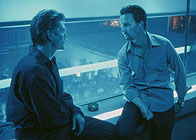|
|
|
|
25th
Hour
|
 |
|
Spike Lee's restless, protean talent is not one that fits easily into the format of a fiction film. Often he seems uneasy with the obligations of telling a neat, linear story. He would much rather create a world, or just follow his characters around from situation to situation. More ambitiously, his films these days regularly break into a mode of highly artificial allegory (as in the dire Bamboozled [2000]), or mix documentary and essayistic segments into the plot. If there is something fumbling or hit-and-miss about every new Lee film, there is also the excitement of a director working within his own idiom. He has taken the lessons of Martin Scorsese further than Scorsese himself. Lee is unafraid to ditch conventional storytelling structure, opting instead for soaring, complex forms or mosaics that seem more akin to improvised jazz solos. This is hardly surprising: few filmmakers use music better, or understand its potential more sensitively, than Lee. Nonetheless, Lee still grapples with the problem of making his stories cohere, of finding some kind of centre to them. 25th Hour is a head scratcher. Like so many of Lee's films, it appears to be about everything and nothing. Whatever Lee cares about most strongly in the period of making the work finds it way into the film: in this case, that's everything from September 11 to the tensions of multiculturalism. What do these weighty issues, gestured to on the fly, have to do with the story of Monty (Edward Norton), a drug dealer who is on his way to jail? I am still trying to work that one out. On the intimate, interpersonal level, David Benioff's script (from his novel) seems to be an intrigue concerning trust. Was Monty turned in to the cops by his young companion, Naturelle (Rosario Dawson)? What's really happening in the faintly homo-erotic banter between Monty and his two best mates, Slaughtery (Barry Pepper) and Jacob (Philip Seymour Hoffman)? Guys having sex with young or legally under-age women registers as an obsession of this film, especially in a hilarious, almost Woody Allen-style subplot involving Jacob and his precocious high school Lolita, Mary (Anna Paquin). But how does this relate to the themes of interpersonal trust or urban crime? Go figure. Then there is, late in the film, an elaborate excursus into the realm of Monty's shadow life – perhaps the life he might have led if a few things had gone just a little differently. Perhaps this is Lee's fulsome homage to the dream-life which Jesus lives out in Scorsese's The Last Temptation of Christ (1988). The publicity for the film presents this particular idea as its core, the topic it most fervently builds to. But it makes sense of very little that precedes it. From scene to scene, 25th Hour is highly watchable, often compelling. Norton is at his best when he receives strong direction, as happens here. Lee relaxes with everyday scenes in which his characters simply interact, exploring the boundaries of their relationships on the street or in bars. Of course, he cannot resist inserting rather risible, didactic sequences like the one in which Monty's double speaks to him from a mirror, spewing forth obscenities about every racial, sexual and social minority in New York. Ah, New York: when all else fails to cohere, Lee and his fans can always claim that his films, ultimately, are about that great city, nothing more and nothing less. Perhaps Lee wishes he was making movies in the silent era, when a loose genre called the city symphony freely mixed fragments of documentary and fiction. But the collage effect, as exciting as its individual details can be, never entirely works for Lee. He chases too many impulses in too many directions. He needs to temper his free jazz instinct with just a little more classical control. MORE Lee: A Huey P. Newton Story, Jungle Fever, Malcolm X, The Original Kings of Comedy, Summer of Sam, Lumière and Company, Girl 6 © Adrian Martin June 2003 |
![]()